Hundredweight
Configure your account to support hundredweight shipping and designate a package as hundredweight when calling the Shipium APIs.
About hundredweight
Hundredweight is a standard shipping pricing unit, typically equal to 100 pounds, that offers the advantages of fewer operational handling requirements and decreased cost. Ecommerce organizations generally select the hundredweight pricing option for shipping goods that do not take up an entire shipping vessel's space (i.e., less than truckload) or that are below the maximum weight allowed by a particular carrier.
Hundredweight configuration requirementTo be able to specify the hundredweight designation in shipments, you must meet the following requirements:
- At least one hundredweight fulfillment context set up within the Shipium platform
- At least one carrier contract including hundredweight capability
- A UPS account with Scheduled Pickup enabled. UPS Hundredweight Service is only available to customers who have a Scheduled Pickup account (daily pickup service). Contact your UPS representative to enable Scheduled Pickup for your account if it isn't already configured.
The steps for setup are included in this document. Your Implementation team member is available to assist you with this configuration.
United Parcel Service (UPS) supports the hundredweight pricing option for shipping, and Shipium's platform allows passing the hundredweight designation in your calls to our application programming interfaces (APIs). However, you first must configure your Shipium account to accept the hundredweight shipping option for UPS.
FedEx offers a similar option with its multiweight shipping. To enable FedEx's multiweight discount, you'll need to contact your FedEx account representative.
Further information can be found by clicking the link beside each carrier name:
- UPS's Hundredweight: https://www.ups.com/media/en/1dasavercwt_x.pdf
- FedEx's Multiweight: https://www.fedex.com/en-us/shipping/multiweight.html
Important: Dedicated UPS account recommendationIf you ship both UPS Hundredweight and standard UPS shipments, we strongly recommend using separate UPS accounts for each shipping method.
Why separate accounts? When the same UPS account is used for both Hundredweight and standard UPS shipments, tracking numbers can overlap, potentially causing tracking confusion and operational issues.
Best practice. Maintain a dedicated UPS account exclusively for Hundredweight shipping to ensure proper tracking number management and avoid conflicts with your standard UPS shipments.
Configure your account for hundredweight shipping
In order to start using the UPS hundredweight designation in your calls to Shipium's APIs, you'll need to configure:
- the desired carrier account to be associated with your hundredweight shipments;
- the carrier rates to be used for hundredweight shipments;
- the carrier rate sets to be used for hundredweight shipments;
- the carrier contracts to be used for hundredweight shipments; and
- a fulfillment context for hundredweight shipping.
The following subsections provide instructions for configuring your account for hundredweight shipping. You should select UPS for carrier options in your configurations. To get started, you must access the Shipium Console.
Configure your carrier account for hundredweight
- Once logged into the Shipium platform, you'll select Configure and then Fulfillment Configuration from the lefthand navigation menu.
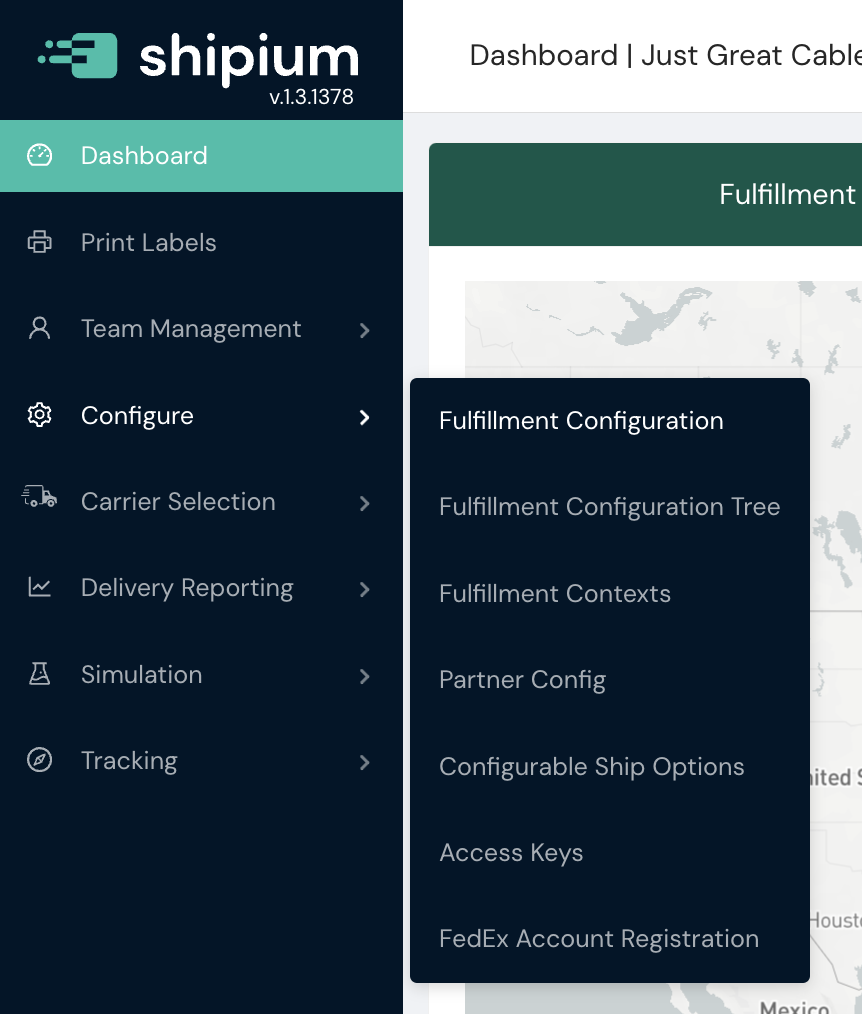
- Within Fulfillment Configuration, you'll scroll to find the Carrier Configuration menu, which includes Carrier Accounts.

- After selecting Carrier Accounts, you'll choose the + Add Carrier Accounts button in the top left of the screen to add a new carrier account. Any previously created carrier accounts for your organization will be listed on this page.

- To create a new carrier account, you'll need to provide the required information. Some fields do not appear until other fields are completed.

- Carrier. You must select United Parcel Service (UPS) from the dropdown menu of carriers to enable UPS's hundredweight designation to be passed in your calls to Shipium's APIs.
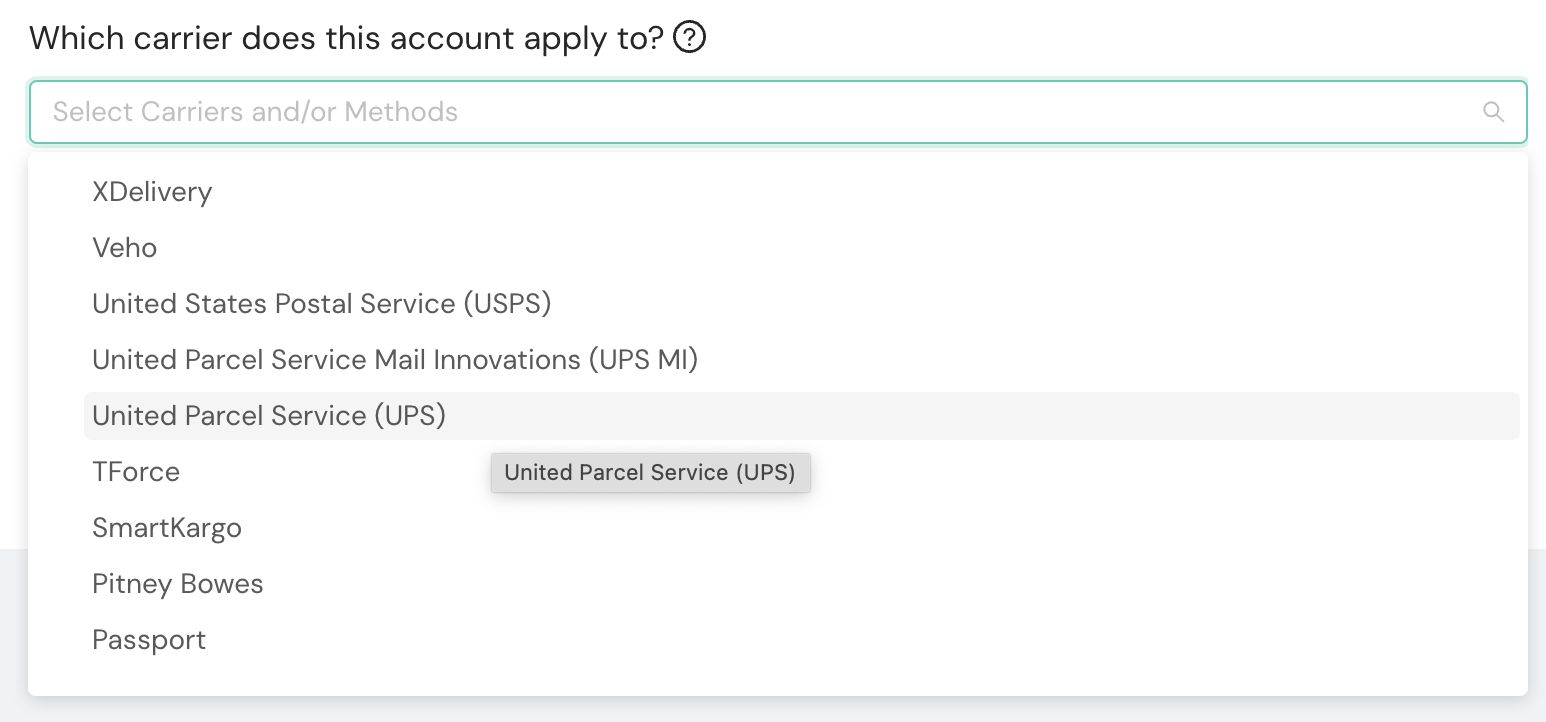
- Return To Address. A return to address is the address where a package will be returned, if it is undeliverable for any reason. You can select an existing address from the dropdown menu or add a new address by selecting the + Add New Address button.
- Return To Contact. A return to contact is the person within your organization who serves as the point of contact regarding shipment returns. You can select an existing contact from the dropdown menu or add a new contact by selecting the + Add New Contact button.
- Credentials. You'll provide your organization's UPS account number.
- Cost Center. You can provide an optional cost center identifier to be used for categorizing expenses.
- Carrier Account Name. The name is what you want to call this account. Including the carrier name is generally a good idea (e.g., UPS Account).
- Carrier Account Description. You can provide an optional description to help organize your carrier accounts.
- Tenant Select. This is an optional step for organizations employing tenants in their fulfillment network. If your organization uses tenants, you'll select the desired tenant from the dropdown list. If you don't have tenants set up for your account yet, you can add new tenants by accessing the Tenants card from Carrier Configuration after selecting Configure from the lefthand navigation menu.
Next, you'll configure the carrier rates for the newly created carrier account, as described in the next subsection.
Configure your carrier rates for hundredweight
- Once logged into the Shipium platform, you'll select Configure and then Fulfillment Configuration from the lefthand navigation menu.
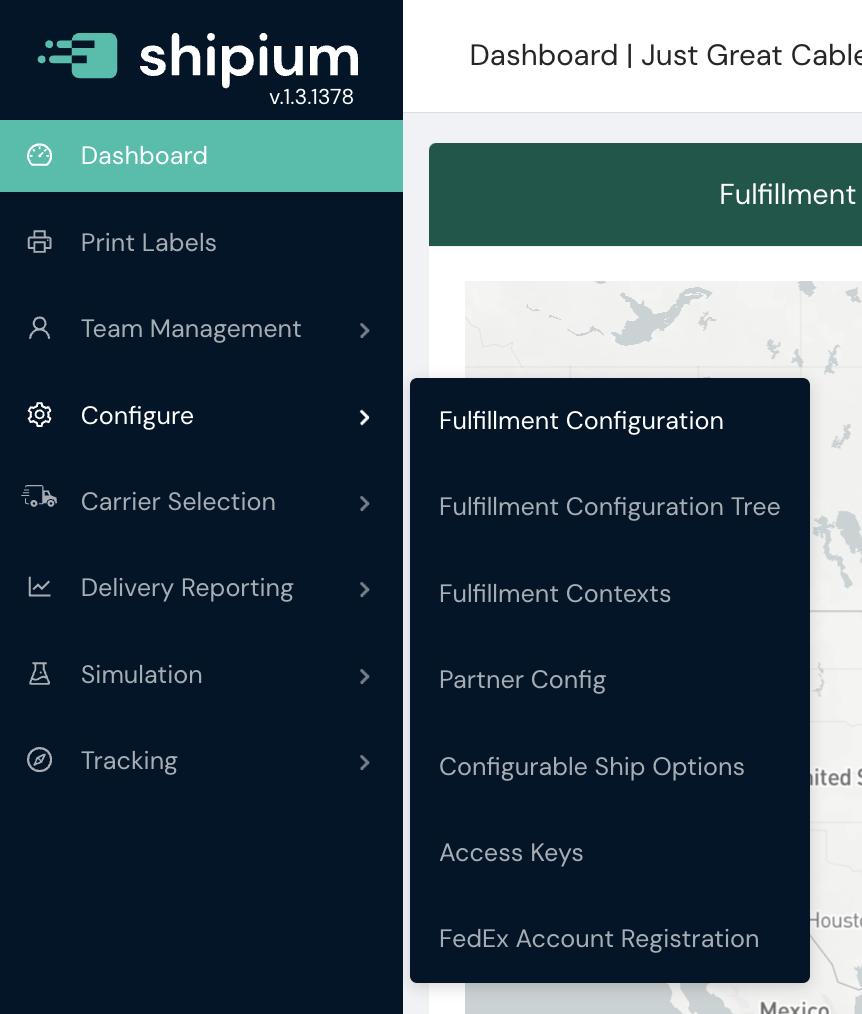
- Within Fulfillment Configuration, you'll scroll to find the Carrier Configuration menu, which includes Carrier Rates.

- After selecting Carrier Rates, you'll choose the + Add Carrier Rates button in the top left of the screen to add a new carrier rate. Any previously created carrier rates for your organization will be listed on this page.

- To create a new carrier rate, you'll need to provide the required information. Some fields do not appear until other fields are completed.
- Carrier. You must select United Parcel Service (UPS) from the dropdown menu of carriers to enable UPS's hundredweight designation to be passed in your calls to Shipium's APIs.
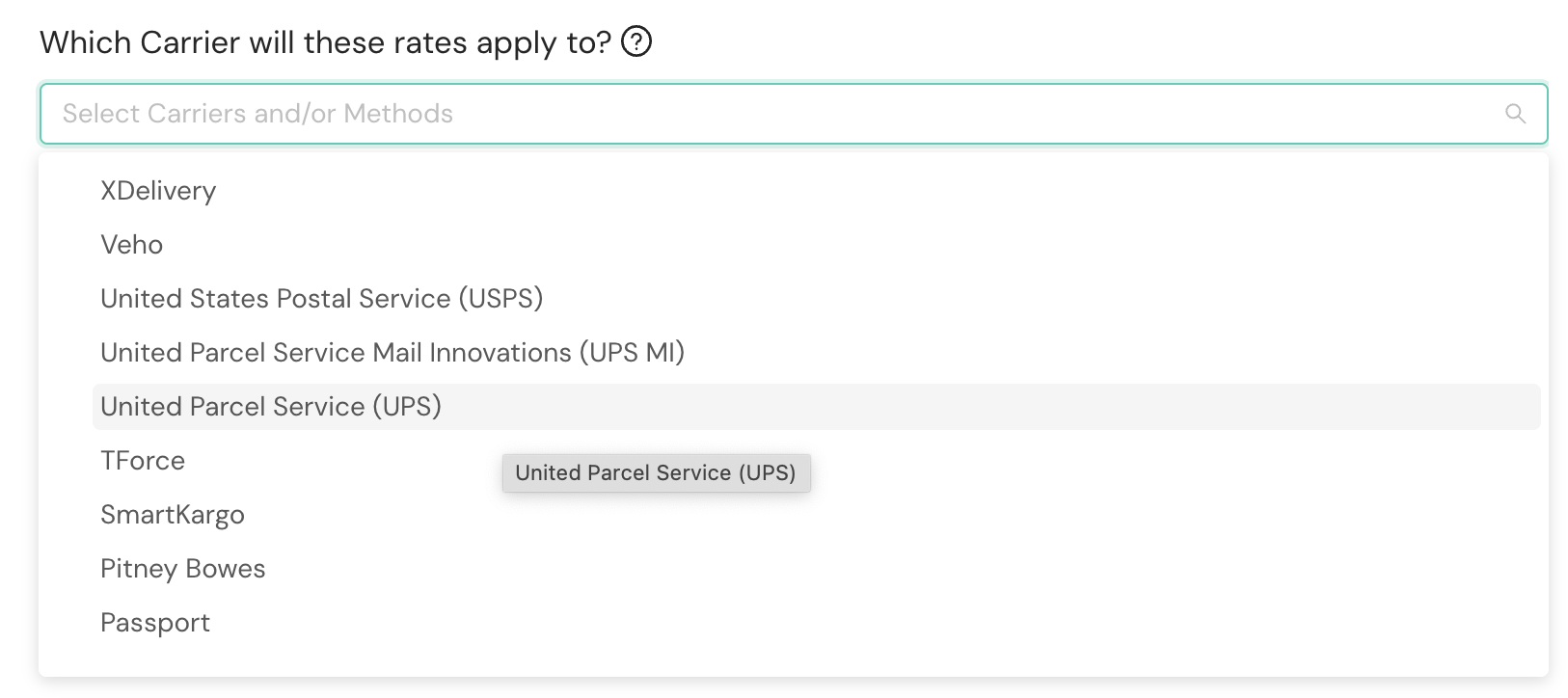
- Carrier Service Methods (appears after selecting Carrier). You must select a United Parcel Service (UPS) service method with the hundredweight designation to enable UPS's hundredweight designation to be passed in your calls to Shipium's APIs. You'll need to repeat this Carrier Rates workflow for each UPS hundredweight service method your organization plans to use.
- Destination Type. You'll select the Commercial, Residential, or All option from the dropdown menu.
- Calendar Start. This is the effective start date for the carrier rate.
- Calendar End. This is the effective end date for the carrier rate. If no end is scheduled, one year from the calendar start is a general selection for this field.
- Dimweight Volume Threshold. When present, a custom dimweight volume threshold replaces the minimum volume needed to apply dimensional weight.
- Negotiated Dimweight Divisor. The DIM divisor is a number set by carriers that represents cubic inches per pound. Your organization may have negotiated a custom value with the carrier.
- Carrier Rates. You'll upload your rate table for this carrier service method.
- Carrier Surcharges. This step is optional for adding any applicable surcharge modifiers for the rates for this carrier service method.
- Carrier Rate Name. The name is what you want to call this carrier rate. Including the carrier name is generally a good idea. The carrier name and service method auto-populate in this field. Shipium recommends keeping this value for your carrier rate name, unless you employ tenants in your network. If you use tenants, adding the tenant name to the Carrier Rate Name is recommended.
- Carrier Rate Description. You can provide an optional description to help organize your carrier rates.
- Tenant Select. This is an optional step for organizations employing tenants in their fulfillment network. If your organization uses tenants, you'll select the desired tenant from the dropdown list. If you don't have tenants set up for your account yet, you can add new tenants by accessing the Tenants card from Carrier Configuration after selecting Configure from the lefthand navigation menu.
Next, you'll configure the carrier rate set for the newly created carrier rate, as described in the next subsection.
Configure your carrier rate sets for hundredweight
- Once logged into the Shipium platform, you'll select Configure and then Fulfillment Configuration from the lefthand navigation menu.
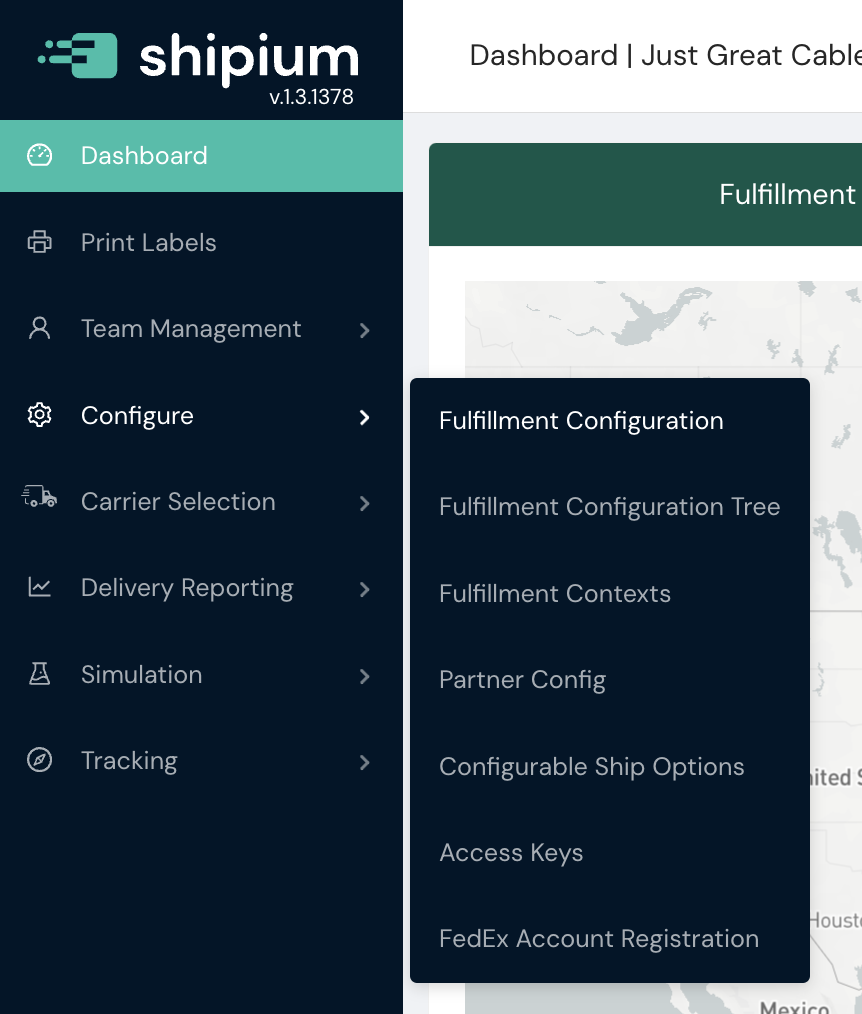
- Within Fulfillment Configuration, you'll scroll to find the Carrier Configuration menu, which includes Carrier Rate Sets.
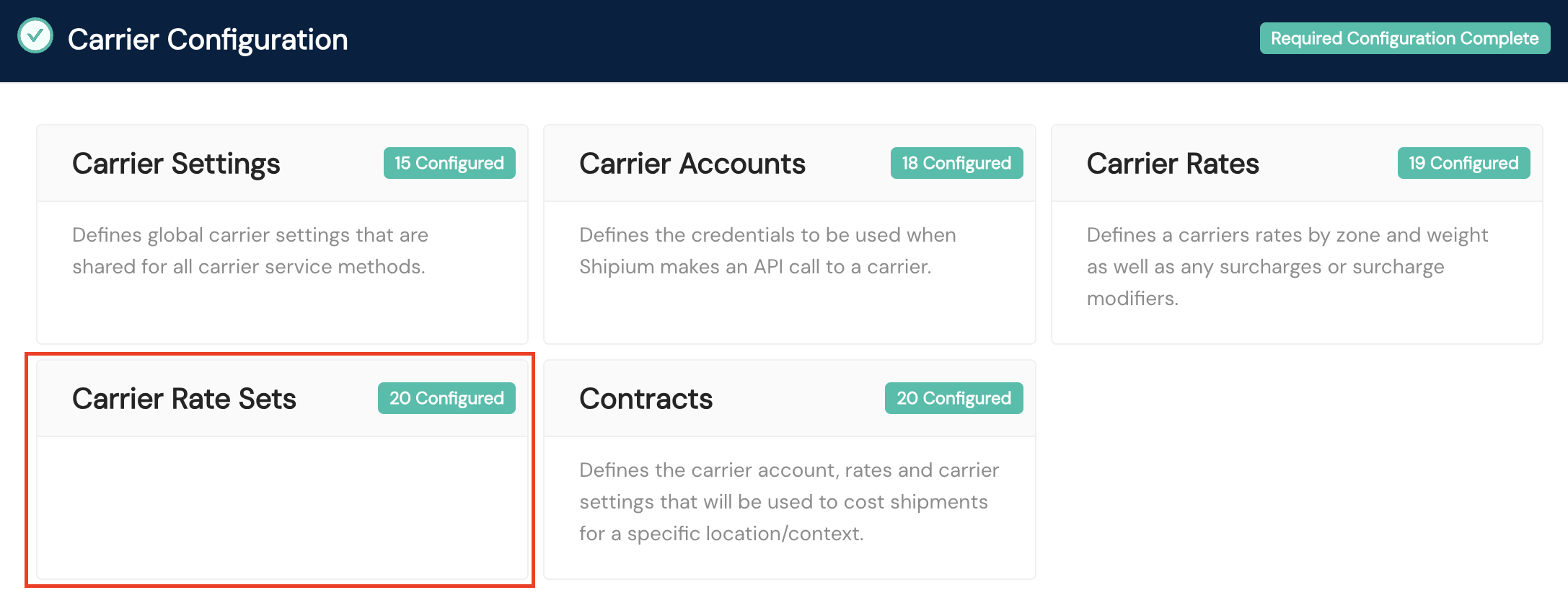
- After selecting Carrier Rate Sets, you'll choose the + Add Carrier Rates button in the top left of the screen to add a new carrier rate. Any previously created carrier rate sets for your organization will be listed on this page.

- To create a new carrier rate set, you'll need to provide the required information. Some fields do not appear until other fields are completed.

- Carrier. You must select United Parcel Service (UPS) from the dropdown menu of carriers to enable UPS's hundredweight designation to be passed in your calls to Shipium's APIs.
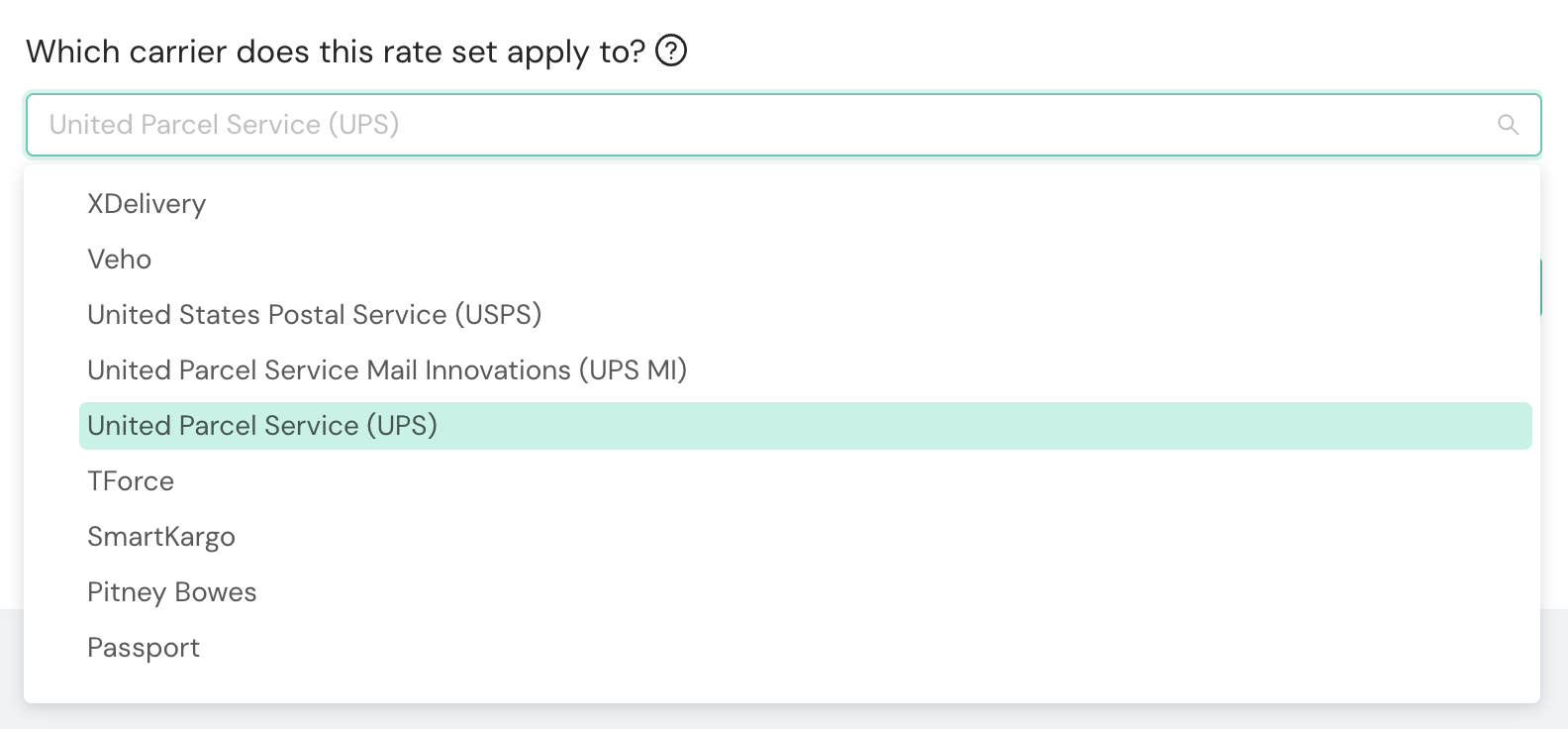
- Rate Set Entries. You'll select the UPS hundredweight carrier rates you configured in the previous subsection from the dropdown menu.
- Rate Set Name. The name is what you want to call this rate set. Including the carrier name is generally a good idea. The carrier name auto-populates in this field. Shipium recommends keeping this value for your carrier rate set name, unless you employ tenants in your network. If you use tenants, adding the tenant name to the Rate Set Name is recommended.
- Rate Set Description. You can provide an optional description to help organize your rate sets.
- Tenant Select. This is an optional step for organizations employing tenants in their fulfillment network. If your organization uses tenants, you'll select the desired tenant from the dropdown list. If you don't have tenants set up for your account yet, you can add new tenants by accessing the Tenants card from Carrier Configuration after selecting Configure from the lefthand navigation menu.
Next, you'll configure the carrier contract for the newly created carrier rate set, as described in the next subsection.
Configure your carrier contract for hundredweight
- Once logged into the Shipium platform, you'll select Configure and then Fulfillment Configuration from the lefthand navigation menu.
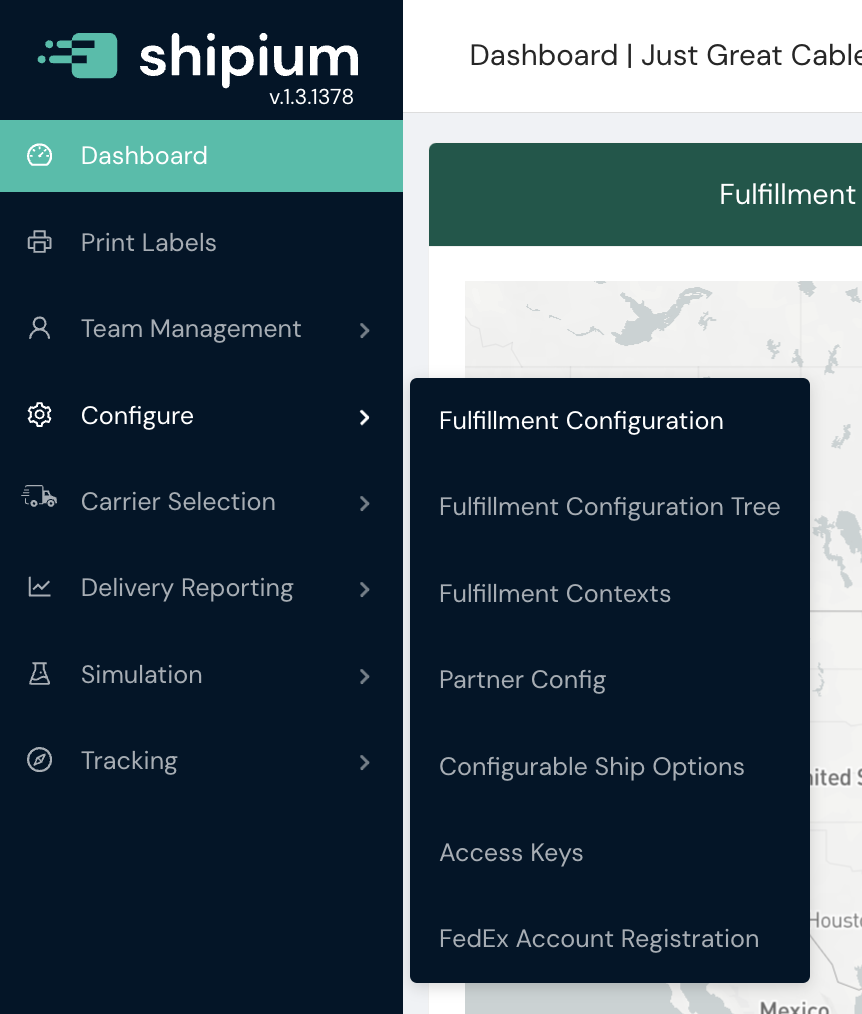
- Within Fulfillment Configuration, you'll scroll to find the Carrier Configuration menu, which includes Contracts.

- After selecting Contracts, you'll choose the + Add Contracts button in the top left of the screen to add a new contract. Any previously created contracts for your organization will be listed on this page.

- To create a new contract, you'll need to provide the required information.
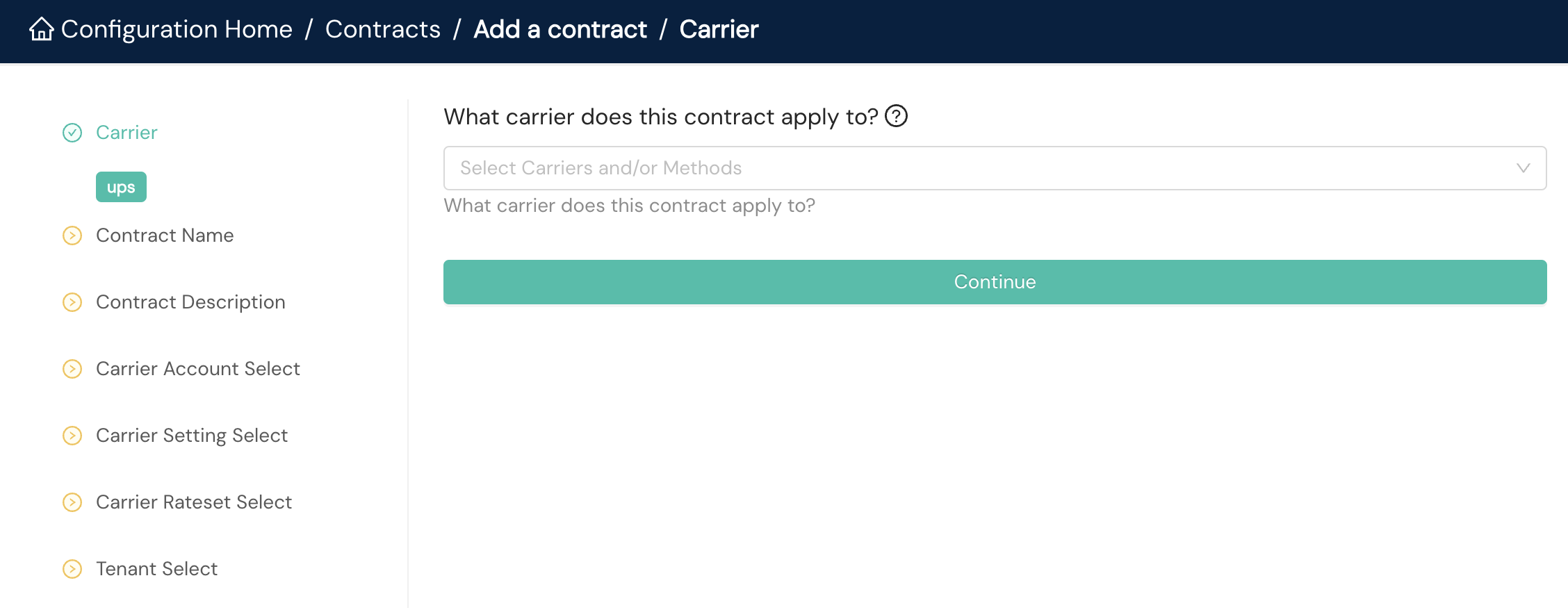
- Carrier. You must select United Parcel Service (UPS) from the dropdown menu of carriers to enable UPS's hundredweight designation to be passed in your calls to Shipium's APIs.
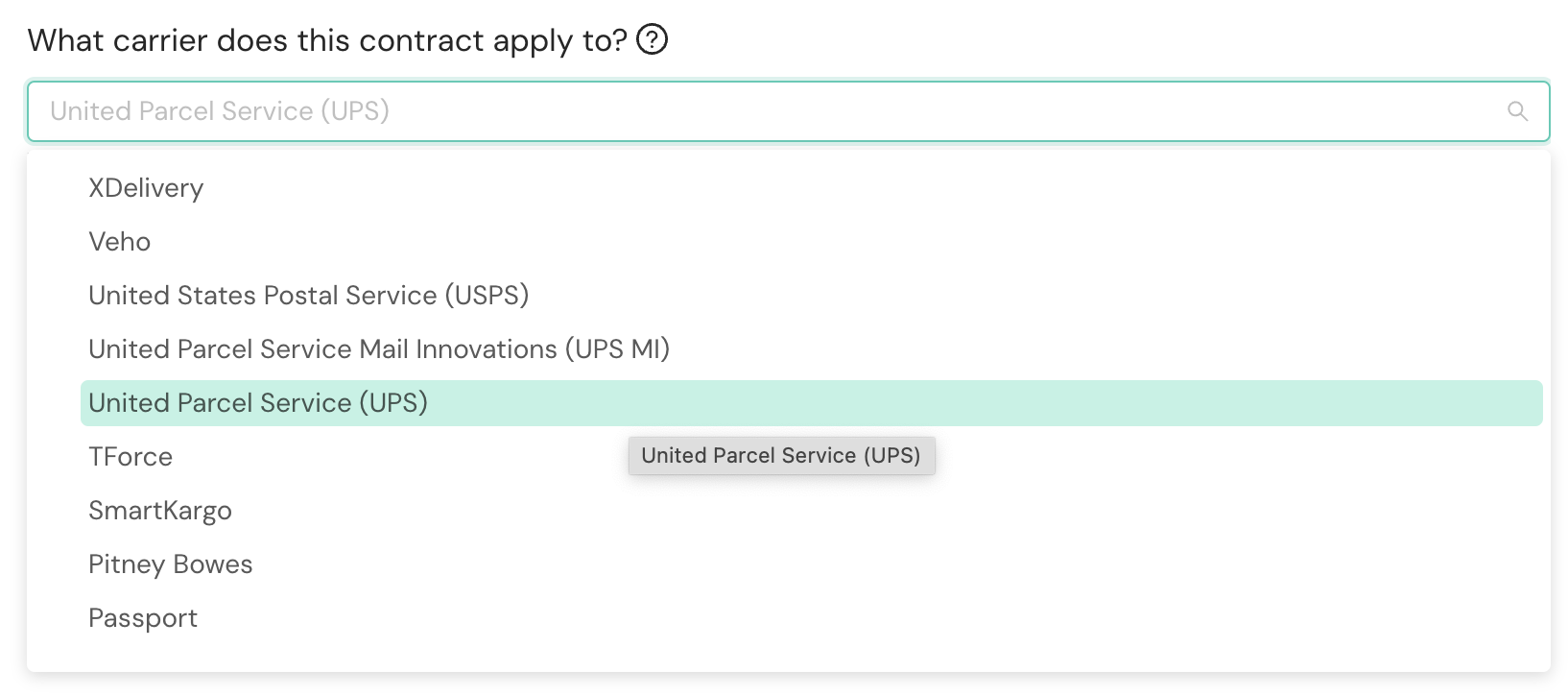
- Contract Name. The name is what you want to call this contract. Including the carrier name is generally a good idea. The carrier name auto-populates in this field. Shipium recommends keeping this value for your contract name, unless you employ tenants in your network. If you use tenants, adding the tenant name to the Contract Name is recommended.
- Contract Description. You can provide an optional description to help organize your contracts.
- Carrier Account Select. You'll select the carrier account that you established previously for your hundredweight shipping from the dropdown menu.
- Carrier Setting Select. You'll select UPS carrier settings from the dropdown menu. If you don't have carrier settings set up for your account yet, you can add new carrier settings by accessing the Carrier Settings card from Carrier Configuration after selecting Configure from the lefthand navigation menu.
- Carrier Rateset Select. You'll select the carrier rate set that you established previously for your hundredweight shipping from the dropdown menu.
- Tenant Select. This is an optional step for organizations employing tenants in their fulfillment network. If your organization uses tenants, you'll select the desired tenant from the dropdown list. If you don't have tenants set up for your account yet, you can add new tenants by accessing the Tenants card from Carrier Configuration after selecting Configure from the lefthand navigation menu.
Next, you'll configure the hundredweight fulfillment context, as described in the next subsection.
Configure your hundredweight fulfillment context
- Once logged into the Shipium platform, you'll select Configure and then Fulfillment Configuration from the lefthand navigation menu.
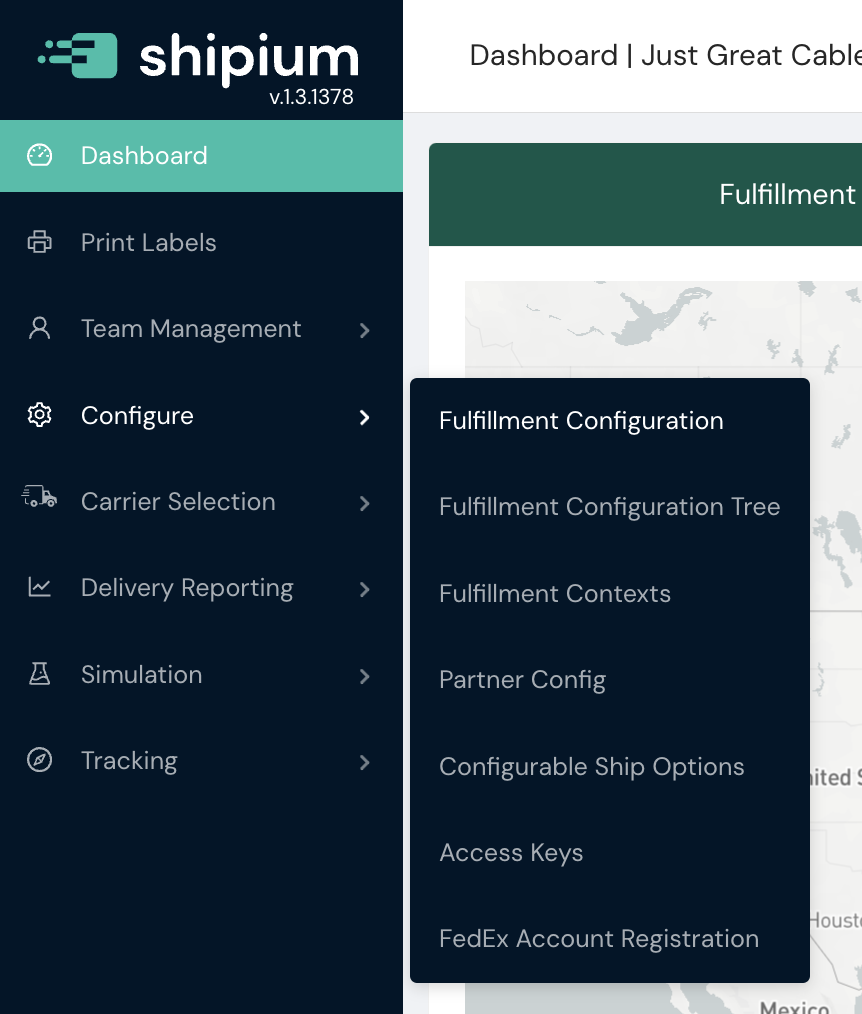
- Within Fulfillment Configuration, you'll scroll to find the Carrier Selection Configuration menu, which includes Fulfillment Contexts.
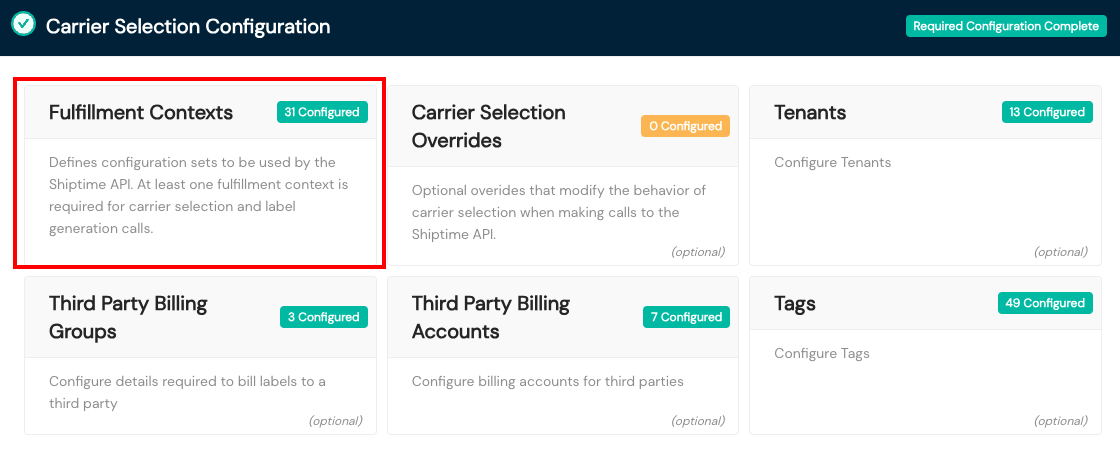
- After selecting Fulfillment Contexts, you'll choose the + Add Fulfillment Contexts button in the top left of the screen to add a new fulfillment context. Any previously created fulfillment contexts for your organization will be listed on this page.

- To create a new fulfillment context, you'll need to provide the required information.
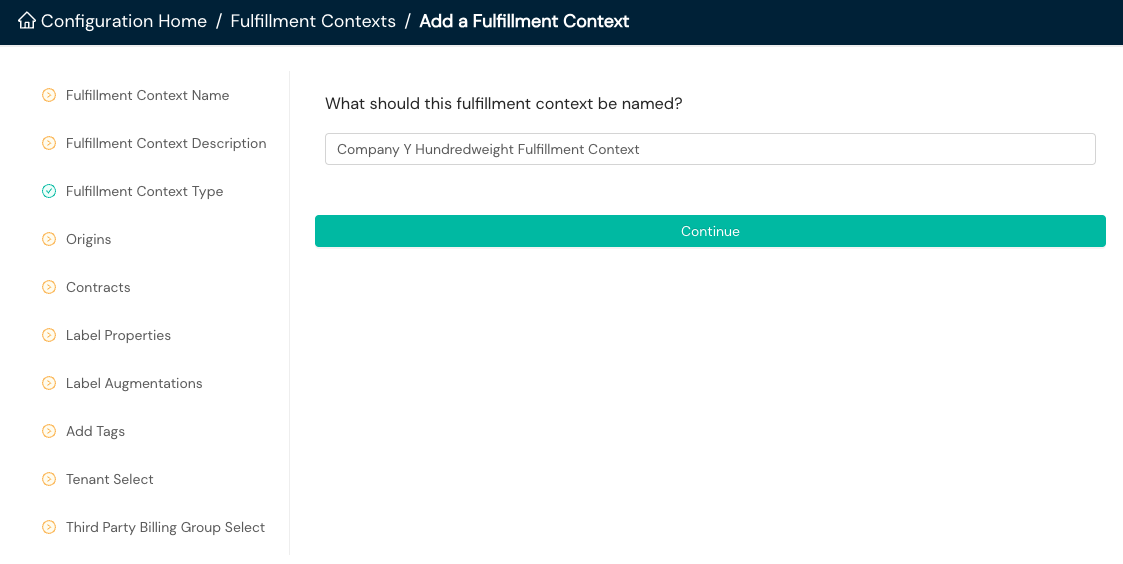
- Fulfillment Context Name. This is the human readable name your organization wishes to assign to the fulfillment context.
- Fulfillment Context Description. This is an optional description to help you organize your fulfillment contexts.
- Fulfillment Context Type. For the hundredweight designation, you'll select Hundredweight from the dropdown menu.

- Origins. You'll select your network origins to be used for this fulfillment context. You also may add origins later.
- Contracts. You'll select the contract you established for hundredweight shipping previously. You also may add contracts later.
- Label Properties. You'll select your desired label dimensions, rotation, and resolution from a dropdown menu.
- Label Augmentations. You'll be able to search for and select a configured set of label augmentations from your account or create a new augmentation set. This is an optional step.
- Add Tags. You'll be able to search for and select a tag from your account or create a new tag. This is an optional step.
- Tenant Select. This is an optional step for organizations employing tenants in their fulfillment network. If your organization uses tenants, you'll select the desired tenant from the dropdown list. If you don't have tenants set up for your account yet, you can add new tenants by accessing the Tenants card from Carrier Configuration after selecting Configure from the lefthand navigation menu.
- Third Party Billing Group Select. If your organization doesn't use third party billing, you'll select the Skip Optional Step button for this step. Otherwise, you can select any third party billing groups to which the fulfillment context will be linked.
- Next, you'll have an opportunity to review the Add Fulfillment Context Summary before saving the new fulfillment context.
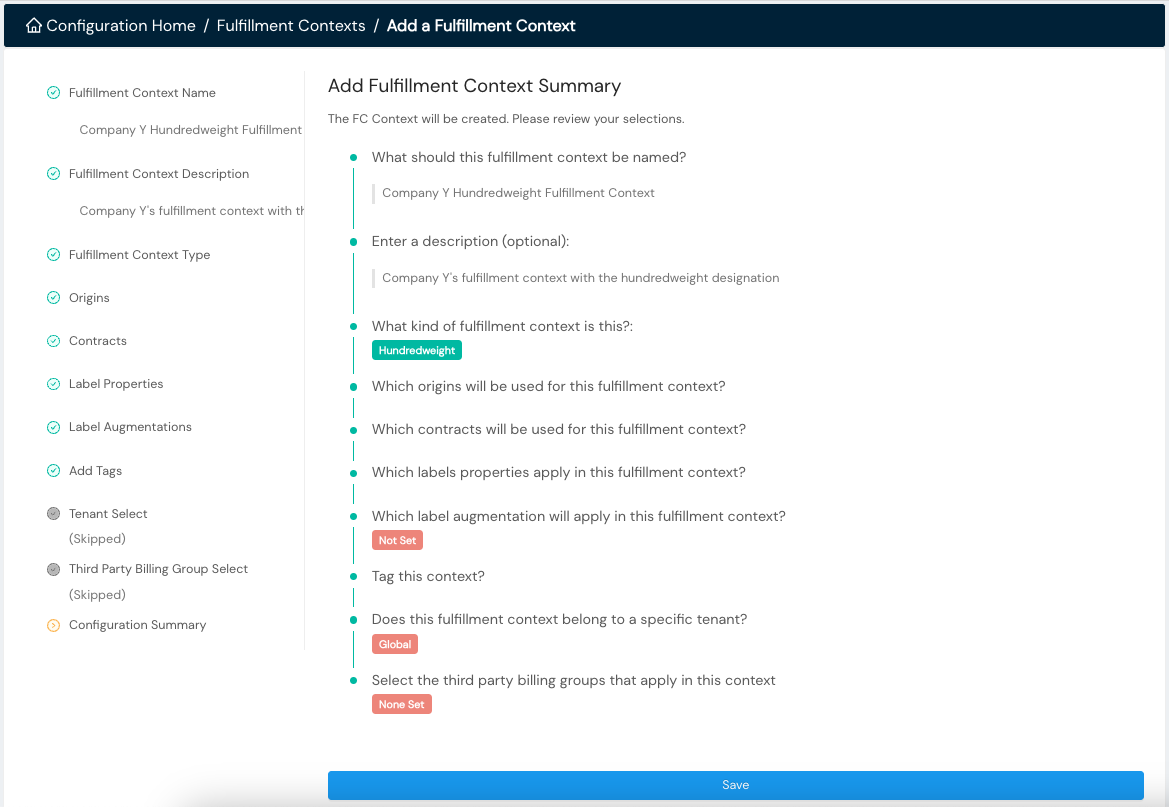
- Once you've saved the new fulfillment context, it will appear in the list on your Fulfillment Contexts page, with a dropdown menu option to see all the fulfillment context's details, edit the context, or delete it.
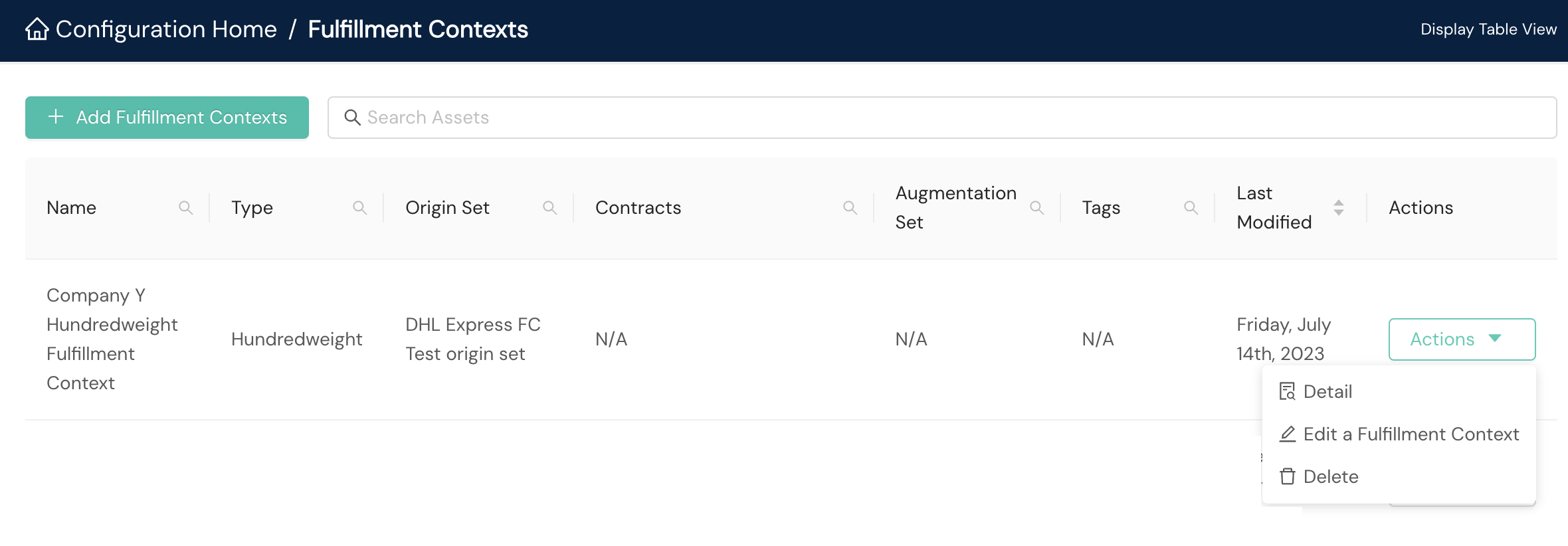
Specify hundredweight in shipments
In order to enable service methods available for hundredweight (UPS) and multiweight (FedEx), your organization will need to specify that the shipment is hundredweight when calling Shipium's APIs. You can specify a hundredweight property in order to make sure that the hundredweight shipment is considered for applicable carrier service methods in your organization's carrier contracts that support hundredweight when making a call to Shipium's Carrier Selection service.
Hundredweight information is provided within shipments as part of the fulfillmentType field. Specifically, you should include hundredweight in the existing field shipmentParameters.fulfillmentType, as shown in the example below.
Short example of additional details in the body
{
....
"shipmentParameters": {
"fulfillmentType": "hundredweight"
....
},
"generateLabel": true,
"labelParameters": {
....
}
}Example API request including hundredweight designation
If your organization doesn't implement Shipium's shipment methods and your physical process doesn't separate carrier/method selection from label generation, you can use this API to combine the two separate calls into a single call.
The endpoint for the Carrier and Method Selection with Label Single Call API is included in the table below.
| API type | API endpoint |
|---|---|
| POST | /api/v2/shipment/carrierselection/label |
Example cURL call
curl --request POST \
--url https://api.shipium.com/api/v1/shipment/carrierselection/label \
--header 'accept: application/json' \
--header $AUTHSTRING \
--header 'content-type: application/json' \
--data 'INSERT REQUEST BODY FROM BELOW'Example request body
The following JSON request body demonstrates inclusion of the hundredweight value for the fulfillmentType field.
{
"currencyCode": "usd",
"generateLabel": true,
"labelParameters": {
"currencyCode": "usd",
"labelFormats": [
"zpl"
],
"eligibleForManifest": true,
"includeLabelImagesInResponse": true
},
"shipmentParameters": {
"fulfillmentType": "hundredweight",
"partnerShipmentId": "myCustomPartnerShipmentId123",
"shipiumShipmentId": "49cf130d-b297-4c12-aa7d-82ea80208fde",
"orderedDateTime": "2019-10-29T09:12:33.123456Z",
"shippedDateTime": "2019-11-01T12:11:33Z",
"shipOption": "standard",
"referenceIdentifier": "yourCustomIdentifier",
"testMode": true,
"shipmentTags": [
"signature-required"
],
"destinationAddress": {
"addressType": "residential",
"name": "Wile E. Coyote",
"company": "ACME",
"street1": "123 Warehouse St.",
"street2": "Suite 42",
"city": "Albuquerque",
"state": "NM",
"countryCode": "US",
"postalCode": "87121"
},
"orderItemQuantities": [
{
"productDetails": [
"ormd",
"lio"
],
"productId": "PRODUCTID001",
"quantity": 3
}
],
"packagingType": {
"packagingMaterial": "box",
"linearDimensions": {
"linearUnit": "in",
"length": 9,
"width": 6,
"height": 3
},
"packagingWeight": {
"weight": 6.58,
"weightUnit": "lb"
}
},
"shipFromAddress": {
"addressType": "commercial",
"city": "Albuquerque",
"company": "ACME",
"countryCode": "US",
"name": "L. Merfudd",
"postalCode": "87121",
"state": "NM",
"street1": "123 Main St.",
"street2": "Suite 42"
}
}
}Example response
{
"carrierSelection": {
"carrier": "ups",
"carrierAccountId": "4be237e4-eeb2-4e8a-94ea-6db695313ca6",
"carrierSelectionDateTime": "2020-11-19T21:08:54.305Z",
"carrierSelectionId": "5b0514bc-3cae-4311-af44-a95e64003631",
"partnerId": "96ddb56a-18ba-4034-a14e-3fab072478f4",
"serviceMethodName": "ground",
"serviceMethodUrn": "c645ea83-d161-4e28-b8cb-39bf1a620cd3:4e14aaa3-198b-4861-b658-faf51031c84c:83fe5227-a765-45b2-bc2a-cb919ddce922:1",
"totalCost": 7.53
},
"carrierName": "ups",
"carrierTrackingId": "1Z999AA10123456784",
"deliveredDateTime": "2020-10-31T10:50:11.123456Z",
"estimatedDeliveryDate": "2022-12-02T03:00:00Z",
"destinationAddress": {
"addressType": "residential",
"name": "Wile E. Coyote",
"company": "ACME",
"street1": "123 Warehouse St.",
"street2": "Suite 42",
"city": "Albuquerque",
"state": "NM",
"postalCode": "87121",
"countryCode": "US"
},
"fulfillmentCenterId": "74065136-85c2-499b-b893-bd812ac0c00f",
"carrierLabel": {
"effectiveShipDateTime": "2022-11-28T03:00:00Z",
"testMode": true,
"carrier": "ups",
"carrierLabelCurrency": "usd",
"carrierLabelPrice": 7.53,
"billableWeight": {
"weight": 6.0,
"weightUnit": "lb"
},
"carrierSelectionId": "5b0514bc-3cae-4311-af44-a95e64003631",
"carrierServiceName": "ground",
"carrierTrackingId": "1Z999AA10123456784",
"carrierTrackingLink": "https://www.ups.com/track?tracknum=%2B1Z999AA10123456784",
"documents": [
{
"labelExpiration": "2020-11-19T21:08:54.305Z",
"labelFormat": "zpl",
"labelImage": {
"imageContents": "BASE64LOOKINGSTUFFANDWHATHAVEYOUETCETCETC",
"imageEncoding": "base64"
},
"labelUrl": "https://api.shipium.com/labels/1a486afc-2ffc-4c37-928f-8d6aa014b35b.zpl"
}
],
"partnerShipmentId": "myCustomPartnerShipmentId123",
"shipiumShipmentId": "49cf130d-b297-4c12-aa7d-82ea80208fde",
"shipiumLabelId": "5b37704e-130e-4893-82e7-600843475bbb",
"status": "success",
"statusDetails": "Label created successfully"
},
"orderItemQuantities": [
{
"productDetails": [
"lio"
],
"productId": "PRODUCTID001",
"quantity": 3
}
],
"orderedDateTime": "2019-10-29T09:12:33.123456Z",
"packagingType": {
"packagingMaterial": "box",
"linearDimensions": {
"linearUnit": "in",
"length": 9,
"width": 6,
"height": 3
},
"packagingWeight": {
"weight": 6.58,
"weightUnit": "lb"
}
},
"partnerShipmentId": "myCustomPartnerShipmentId123",
"shipFromAddress": {
"addressType": "commercial",
"city": "Albuquerque",
"company": "ACME",
"countryCode": "US",
"name": "L. Merfudd",
"postalCode": "87121",
"state": "NM",
"street1": "123 Main St.",
"street2": "Suite 42"
},
"shipOption": "standard",
"referenceIdentifier": "yourCustomIdentifier",
"shipiumShipmentId": "0840c7a2-e6ab-4755-8aa2-9a986297ad6d",
"shipmentTags": [
"signature-required"
],
"shippedDateTime": "2019-10-29T09:12:33.123456Z",
"totalWeight": {
"weight": 6.58,
"weightUnit": "lb"
},
"fulfillmentType": "hundredweight",
"testMode": true
}Resources
Your Shipium team member is available to help along the way. However, you might find these resources helpful:
Updated 3 months ago
